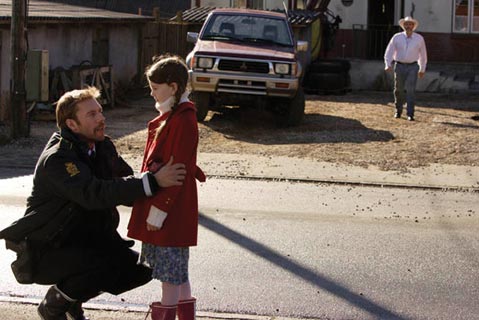Terribly Happy
Jakob Cedergren, Lene Maria Christensen, and Kim Bodnia star in a film written by Gry Dunja Jensesn and Henrik Ruben Genz and directed by Genz.

Most of the hype about this movie is misleading. It is not a Danish Western (which I imagine would sweeter than a spaghetti western), nor an ersatz Coen brothers film. Terribly Happy is actually a decent simulation of the Jim Thompson universe, transposed to the outer limits of Nordic sensibilities. Thompson was the quintessential American noir novelist (The Grifters, The Getaway, Pop. 1280) who best understood how pulp could become poetry—tracking the id-motivated beasts that still haunt the barely civilized prairies and lowlands of these United States. Then, reveling in rough justice, he would show how these thrilling brands of amorality create hells in sun-drenched neighborhoods.
The only real difference between this film and a genuine Thompson romp is that the movie—an Academy nominee this year—was written by Danish novelist Erling Jepsen, and instead of the bleak Texas scrub, Terribly Happy is set on the absolutely flat bogs of northern Europe. In it, Jakob Cedergren plays Robert, a policeman who, we gradually discover, has left behind tortured memories (and family members) after suffering a breakdown in the big city of Copenhagen. He’s now left alone to patrol a little nameless village where the population sticks to its own ways of tolerating and punishing cruelty and vice. This being a grim parable, it of course requires a femme fatale (Lene Maria Christensen), who has made an awful peace with her drunken abusive husband (Kim Bodnia). Or has she?
Though the cinematography is studied and pitilessly steady, it’s not gratuitously showy. The starkness of the countryside dictates a lot of what we feel in this engrossing saga of guilt—rain falling on a murderer disposing of a body; a secret glimpse of blood welling in a visiting sheriff’s footprint. These images manipulate our moods more than they signify any thematic profundities. The film isn’t overly witty, either, except for one prolonged drinking bout that ends in a lavatory wrestling match. I found myself laughing in many such inappropriate situations—which is a kind of irony that feels more like a dime novel than cutting-edge cinema.



